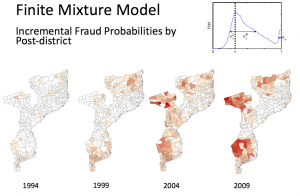You are here
- Home
- Combining Media and Election Forensics Enables Fresh Look at Fraud
Combining Media and Election Forensics Enables Fresh Look at Fraud
24 March 2016

Mozambique is usually cited as one of Africa's post-conflict success stories. After the civil war ended in 1992, Renamo's guerrilla force became the official political opposition. However, although since then its head Afonso Dhlakama has contested and lost all five presidential elections, he claims this is due to electoral fraud and that he won them all. Now, Renamo guerrillas have begun shooting at traffic on the main north-south road, and Dhlakama has promised an armed takeover of government in six provinces.
IKD member Joseph Hanlon is an NUJ journalist who has covered all the elections in Mozambique since 1994 and who is now leading a project to use polling station data to test the official outcome of the elections. Mozambique is unusual because although the ruling party, Frelimo, is willing to cheat, it also accepts a free press and relative electoral transparency. For the October 2014 national election, Joe and his colleagues organised a team of 150 journalists (one in each district) to report on the campaign, the voting and the counting. And the team did find some ballot box stuffing.
Uniquely, the project’s next step combined these reports with statistical techniques of election forensics to discover how widespread the fraud was. Their preliminary conclusion is that there was significant ballot box stuffing – but not enough to cheat Dhlakama out of the presidency.
You can hear more about the project and its findings in Fraud at Polls: Can Journalists and Statisticians Check?, a podcast of an LSE public lecture given by Joe and his LSE colleagues Johan Ahlback and Jouni Kuha.
Share this page:
Monthly Archive
- March 2024 (1)
- November 2023 (1)
- February 2023 (1)
- January 2023 (1)
- November 2022 (1)
- October 2022 (1)
Contact us
To find out more about our work, or to discuss a potential project, please contact:
International Development Research Office
Faculty of Arts and Social Sciences
The Open University
Walton Hall
Milton Keynes
MK7 6AA
United Kingdom
T: +44 (0)1908 858502
E: international-development-research@open.ac.uk
.jpg)